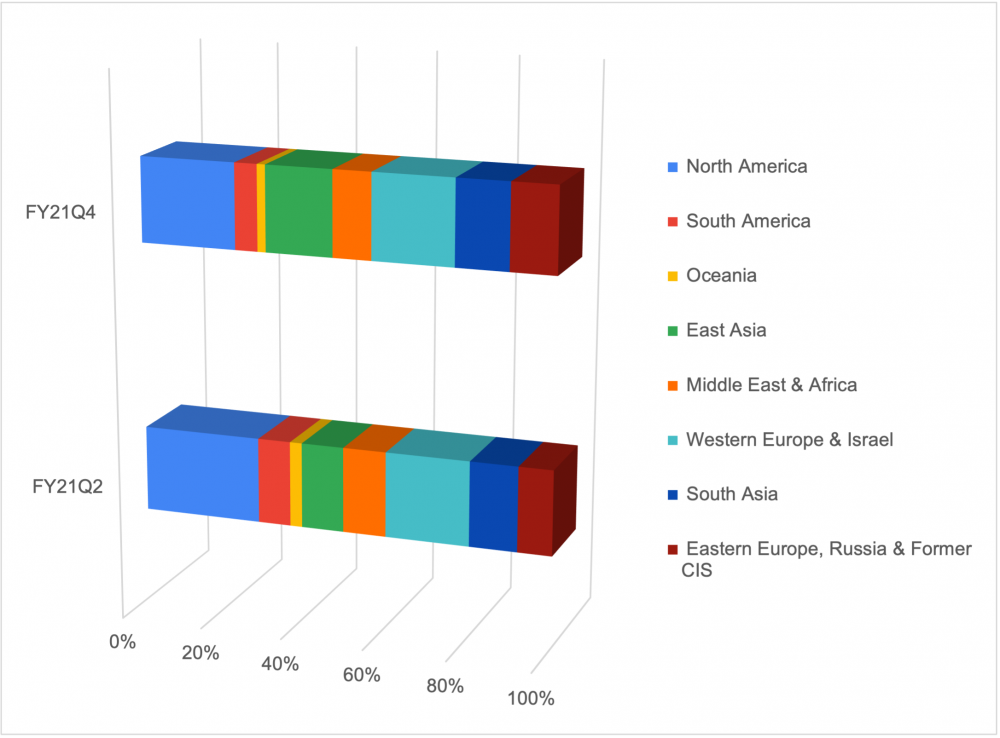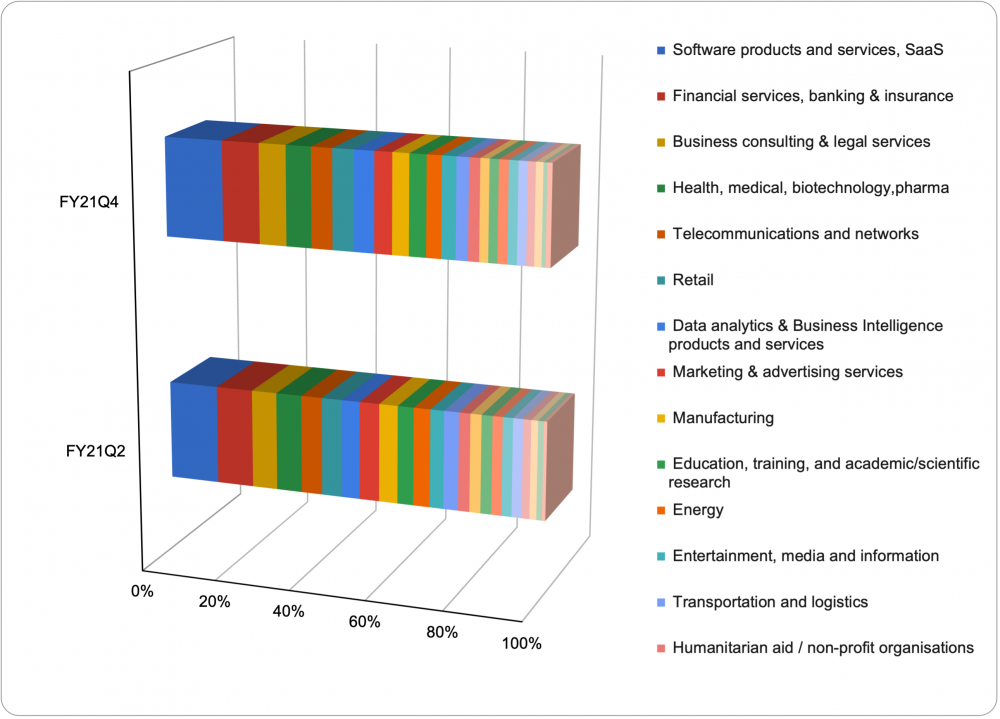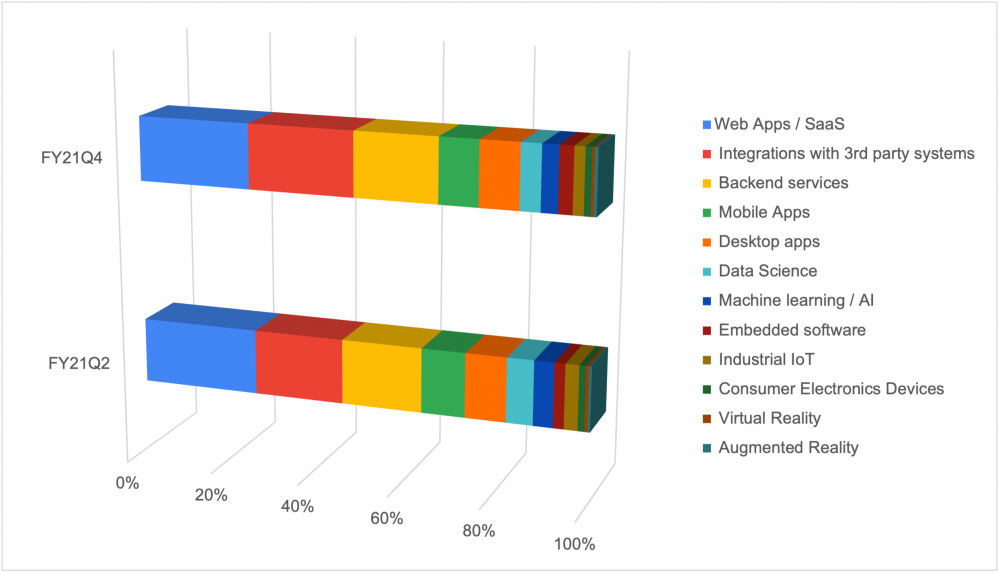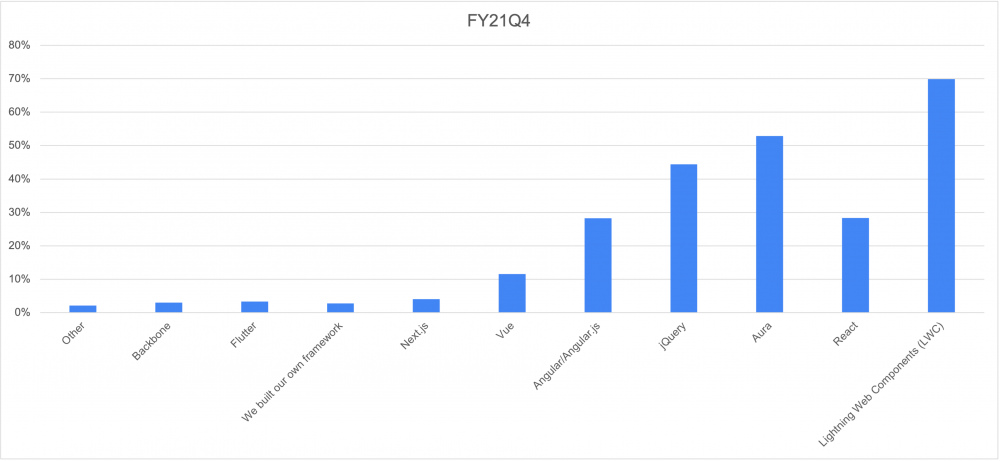Here at Salesforce Developer Relations, our primary goal is to inspire Salesforce Developers and help them be successful. For our mission to be impactful, we need to know what excites you, as well as what you expect, want, and need.
That’s why, every year, we run a global survey or two to hear from our developers and understand the trends in our ecosystem. Last year, we published a blog post summarizing the trends that we found most interesting from the results of the 2020 survey. In this post, we’ll pick up where we left off by summarizing what we found out in the survey that we ran in January 2021. We’ll be comparing the two and looking at similarities and also some new findings!
Salesforce Developer demographics
As we observed last time, more than half of Salesforce Developers worldwide are under the age of 35. Furthermore, most are based in North America, Western Europe, and Israel.

Looking at industries in which Salesforce Developers work, interestingly, the 2021 survey shows a 5% increase in Salesforce Developers reporting that they work in SaaS. The next top three industries remain the same:
- Financial services, banking, and insurance
- Health, medical, biotechnology, and pharma
- Business consulting and legal services
The next two popular industries are telecommunications and retail.

Why are developers building on Salesforce?
Everyone at Salesforce is interested in this data! It’s clear that our developer community works hard to help their customers succeed, as these numbers show:
- 48% are looking to help solve a problem for a client
- 44% are developing on Salesforce to reach their target market
- 38% are looking to build their careers with us
Most Salesforce Developers are building web apps or for SaaS, but we notice an increase in people working on AppExchange or extensions to third party systems.

She loves me, she loves me not
In this latest survey, we asked Salesforce Developers many questions about their relationship and experience with Salesforce solutions and products. From your responses around usage, awareness, ease of deployment, scalability, flexibility, and many other attributes, we find that Salesforce Developers love Sales Cloud, Service Cloud, and the Salesforce Platform the most. Although you are less enthusiastic about Einstein Prediction Builder, Quip, and Pardot, many developers say they also plan to use Einstein Prediction Builder in the next 12 months — more than any other product!
We wanted to get a better sense of which client-side frameworks that Salesforce Developers are using, and we are pleased to see that 70% of the respondents have adopted Lightning Web Components! The second and third most popular are Aura and JQuery.

How do Salesforce Developers learn?
The data tells us that there is a fair mix of programmatic and declarative development on the Salesforce platform. While many of you write code daily, at a very high level (57%), your daily declarative usage is also very high (42%). We also find it fascinating that students who are not yet working as developers are significantly interested in Machine Learning/AI, Data Science, Mobile Development, Augmented, and Virtual Reality.
To achieve your goals, the top five resources used by Salesforce Developers are:
- Trailhead
- Salesforce Stack Exchange
- Salesforce Developer Documentation
- Trailblazer Community
- Salesforce Developer Forums
We also called out our YouTube channel this time in the survey and found that 87.8% of respondents use the Salesforce Developers YouTube Channel! You love the content, too, with almost half of you giving it 5 stars (out of 5), and another third of you giving it 4 stars. Have you subscribed yet?
We mentioned last time how Sample Gallery is a missed opportunity for many developers, with only half of you using it actively. Have you checked it out yet? The Sample Gallery is a great collection of apps for Salesforce Developers that is convenient to refer to and learn from. We add new apps to the gallery regularly, such as Apex Recipes with 100+ examples of how to use Apex, or the AMP Email demos app with interactive examples using AMP Email for Salesforce Marketing Cloud. We also update the apps for each release to ensure that what you refer to is always up to date.
What’s next?
These surveys and the data we collect help us understand you better, so that we can make improvements for you. Do you see yourself reflected in the data? We hope you do, but if not, please reach out to us on Twitter, LinkedIn, or Telegram using the #SFDevSurvey hashtag. If you missed the survey this time, we hope you’ll be able to participate in our next survey, coming October 2021!